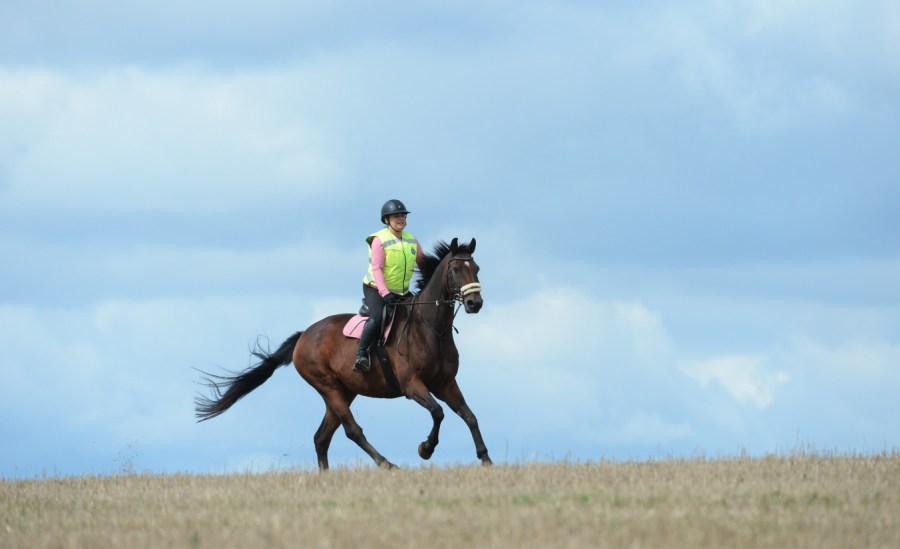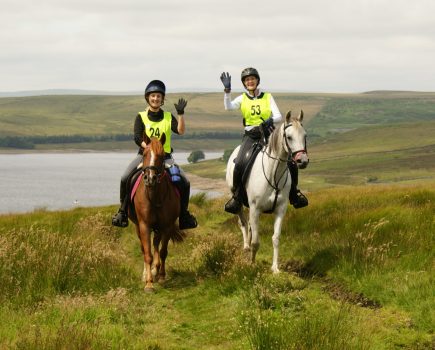In partnership with Wintec Saddles
Whether hacking a horse makes up a small part of your equine’s exercise routine or exploring the countryside is your sole reason for riding, it’s still important that they work correctly when outside of the school. That said, do they have to be working on a contact or in an outline the whole time when out and about?
“I always like to encourage an amount of it,” answers BHS Stage 4 coach Lisa Gilby. “There are different degrees of contact. I think when you start talking about contact, people immediately assume that it’s the same kind of contact you’d have in a dressage arena in front of a judge — but just being able to feel that there’s something at the end of the reins is a contact. It’s just a very light contact.”
When hacking in a contact is beneficial
There are a number of reasons why riding your horse in a contact can be beneficial, including:
1 It keeps him off his forehand
“If you’re just hacking on a loose rein, the horse is likely to drop onto the forehand and not use themselves correctly,” explains Lisa. “If you’re doing hill work it’s particularly good to keep them on a contact, because then they can push from behind and it helps them to lift their shoulders and develop the muscles in their hindquarters.”
This will also give your arms a break, as it will help the horse achieve self-carriage and stop them from leaning onto your hands.
2 It’s safer to have a contact
Even the most bombproof horse can have the occasional spook when they are startled — perhaps a bird flies out from a hedge or a loud noise takes them by surprise and they lurch forward or try to spin round. If you are riding with your reins on the buckle, you could be more at risk of losing control and falling off.
When you have a control, you can react to a situation and regain control much quicker.
“It’s safer on the roads, when you’ve got cars passing, to have your horse together in a contact,” says Lisa. “If you’re wandering along on a loose rein and they suddenly spook then you’ve got to gather up your reins before you can get control of them.”
3 It gives the horse confidence
If you know you’re approaching something particularly spooky, picking up a contact can help you get past stress-free.
“You have to read your horse and get to know what they react to and what they don’t react to,” explains Lisa. “My old veteran used to be a nightmare with daffodils. If I knew I would be riding down the road in the spring and there were daffodils on the verges I would pick him up, put him on a contact and quite often I’d pop him into shoulder-in as well just so he couldn’t see them.
“We’d tootle off down the road and once we’d got past then he could have a longer rein because he’d been really good, hadn’t reacted and did a lovely shoulder-in.”
4 It keeps them listening to you
Lisa adds that having your horse accustomed to being ridden in a contact can be vital in the event that you need to make an emergency stop.
“If you’re cantering across a field and spot a hole coming up, or a tree has fallen down, and you need to suddenly pull up urgently but your horse isn’t used to the contact then he could barrel through it,” advises Lisa.
As well as this, if the only time on a hack you take up a contact is when you’re about to canter, it can lead to excitability as your horse learns to associate a contact with going faster.
5 Your horse is more rideable
Hacking a horse who listens to you is less likely to mean having to dismount to open and close a gate as well.
“If you break it down, you need to sidle up to the side of the gate, undo the catch, and pull it open — the movements that you’re doing are turn-on-the-forehand, rein back, and possibly a little bit of leg yield,” explains Lisa. “Depending on which way you’re opening or shutting the gate, maybe a little quarter pirouette as well. So having your horse listen to you makes life much easier when doing little things like that.”
When you shouldn’t be hacking a horse in a contact
“If you’re hacking out for two or three hours at a time then you don’t want to be on the contact the whole time, because it’s exhausting for your horse,” advises Lisa. “You want to be able to pick them up and put them down. You don’t have to have your horse in an outline, just as long as you can feel that there’s something at the end of the reins so if you react your horse will respond. Sometimes it’s nice to let them have a breather and just relax out hacking rather than work.”
Keeping your horse on a contact for the entire hack can also prevent your horse from being inquisitive of his surroundings — and for some horses it can make them more spooky.
“Horses are naturally ‘nosy’ and if they’re on a contact they don’t get the chance to be,” explains Lisa. “They like to look around and see what’s going on in the world; they learn not to be frightened and how to deal with things. If they’re on a slightly longer rein, they can look and assess a situation. For example, if there’s a horrible noise down the road, like someone pushing a lawnmower and they can’t see it, they can’t work out what it is and may become frightened. If they are on a slightly longer rein and can have a look then it can help them cope.”
Different degrees of contact
Lisa encourages riders she helps to work their horse in a range of contacts and outlines while hacking.
“You could have your horse in a light contact and ask them to stretch down, and then pick them up a little bit and put them in an outline. If you’re on a lovely stretch of bridleway you might then just have them on the buckle end, or like you would when doing free walk on a long rein in a dressage test,” she states.
“If you know there’s something spooky ahead you know you can pick the contact back up again to ride past it. You can mix and match; you don’t always have to have them on a rigid contact or on a completely loose rein.”
If you feel like you struggle to ride your horse in varying degrees of contact, seek assistance.
“If the idea of a hack fills you with dread, or you know going on a certain route will be a nightmare, then it might be time to find some help, especially if you don’t feel like you’re in control,” encourages Lisa. “You get cross-country clinics, dressage lessons and show jumping training, and there’s nothing wrong with getting help to hack.
“I’ve had people come to me saying, ‘I hack, I have the odd problem, can you come and help me?’ All they want to do is hack, and they just want to have a nicer time.”
Lisa Gilby is a BHS Stage 4 Senior Coach and Centre 10 Advanced Coach. She is the manager of Warminster Saddle Club in Wiltshire, teaching military and civilian riders.
This content is brought to you in partnership with Wintec Saddles, durable, comfortable, easy-care, weather-proof saddles for everyone.
Related articles
- Why you should think about your posture when hacking, plus three exercises to improve it
- Why schooling is fundamental to a confident relationship so you both enjoy hacking
- How to improve your horse’s paces while hacking
- How to ride turn-on-the-forehand *VIDEO*
- 10 tips for training a horse to open gates out hacking








